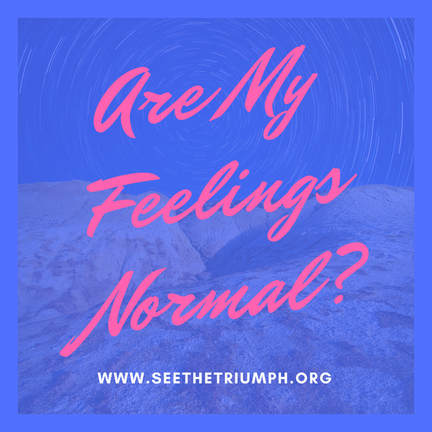|
By Chandler Schmid, See the Triumph Guest Blogger Surviving emotional and physical abuse by a partner or a loved one can cause emotions one has never felt or even fathomed. Whether you are just outside of an abusive relationship, or even years out, these emotions can be extremely difficult to navigate. Most people assume that survivors of abuse are beaten-down victims, a shadow of the person they once were. But they don’t have to be. In fact, they can be happy, sad, confused, and mad, and still be reacting the correct way. You see, the idea that ‘one feeling fits all’ hasn’t worked in everyday situations and certainly does not work here. The most common issue that survivors of abuse admit to facing is the idea of ‘what’s next,’ not knowing where to go, how to feel, bogged down by questions. This post is meant to help deal with one of these common issues: how should I feel? And the answer is surprisingly simple: you should feel exactly how you feel. We are all different people who have different reactions and views. So the emotions stemming from an abusive relationship can be challenging to navigate but can be more common among survivors than you think. The important thing that rings true with sorting through your feelings is knowing that you are not alone. There are men, women, and children, people young and old, all ethnicities, religions, and sexual orientations who are faced with domestic violence. It’s important to note: Some reactions that are negative in nature are OK to feel, but should be talked about with professionals, in groups, or with family and friends. Again, it’s acceptable to feel these ways, but only to the point of where it doesn’t control us. Below are 5 core emotions survivors of all kind can face. These feelings can stem from different places in a persons life, but the result is still the same. The Feeling Of GUILT: Guilt is a very powerful emotion on its own, but coupled with the feelings and memories of abuse can fuel the sensation even more. Many survivors talk about the feeling of guilt and can stem from many different circumstances. A common example is an effected family. It could be because you feel you may have let down the family, separated the children from a parent, and more. It could also come from an internal belief that you brought this upon yourself and your loved ones. Why It’s OK: An abuser tends to know how to press your buttons, knows your weaknesses, and exploits them. They most likely blamed you and said you are the reason it’s happening. Guilt is a natural feeling, but it doesn’t have to define you. The reason your family or life is different is because of the abuser, not because of you. Similar Emotions Felt: Humiliation, shame The Feeling Of ANGER: How could this happen to me? How could they do this? An abusive partner takes from you, holds up your life, and controls you. You don’t have the freedom you deserve. They want to command how you live your life and that can be angering. Imagine telling a friend what they can do and where they can go-they would be upset! They would be angry! Why It’s OK: Anger shows that you are still feeling and that you haven’t lost hope. Anger can be good! You deserve to be angry with your abuser; it shows that you want to fight for what they’ve taken. Similar Emotions Felt: Confusion The Feeling Of FEAR: It is very common to feel fear. Fear your abuser will be back, that you will fall into another similar relationship, fear that you can’t trust yourself. Fear is very powerful controller in fueling what we do and don’t do. Why It’s OK: You just went through possibly the toughest part of your life. It makes sense to fear the future. But as long as you know the signs and reach out for help, you can shed light on the fear and the possibility of anything like it from happening to you or loved ones again. The Feeling Of LONLINESS: Does it feel like you’re in a shell? Like no one can penetrate the wall that’s separating you from speaking your truth? From standing up for yourself? Being able to love? It can feel like no one understands you, that your situation is different from everyone else’s. But people and loved ones want to help. They want to understand. A common abuser tactic is to isolate their victims. The abuser has manipulated your life to cut you off from help, but the abuser no longer has their weapon. Without their manipulation, you have gained control. Why It’s OK: It’s ok to feel like no one gets you, but its different when you never allow someone the chance to help. We all go through stages of helplessness and a desire to hide there, but the people who love you, who are trying to help, want you to see that there’s a light at the end of it all. The Feeling Of HAPPINESS: You read this right! Happiness! You just survived something that some people could never grasp. That fact alone is amazing and powerful. You have regained your life (or are just starting to!) and are beginning a new chapter. You are no longer living in a repressed state-you are free. Why It’s OK: You may be thinking it’s impossible to be happy after living through such a dark time, but some people are joyful survivors! It may not be right away (or maybe it is!), but it’s OK to be happy. You are strong and capable and a fighter. You are taking control and that’s a great reason to be joyful. Similar Emotions Felt: Bliss, strength
 Chandler Schmid is a future social worker who is inspired by helping others and making people feel worthy and validated. She has a heart for children’s issues and is currently pursuing child counseling. Comments are closed.
|
Archives
July 2024
CategoriesAll About Intimate Partner Violence About Intimate Partner Violence Advocacy Ambassadors Children Churches College Campuses Cultural Issues Domestic Violence Awareness Month Financial Recovery How To Help A Friend Human Rights Human-rights Immigrants International Media Overcoming Past Abuse Overcoming-past-abuse Parenting Prevention Resources For Survivors Safe Relationships Following Abuse Schools Selfcare Self-care Sexual Assault Sexuality Social Justice Social-justice Stigma Supporting Survivors Survivor Quotes Survivor-quotes Survivor Stories Teen Dating Violence Trafficking Transformative-approaches |
||||||
Search by typing & pressing enter



 RSS Feed
RSS Feed